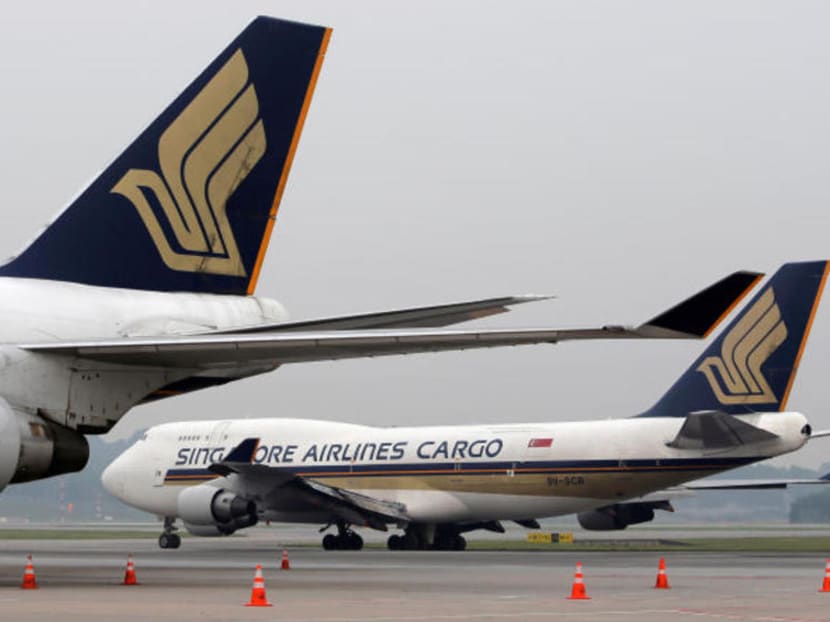Covid-19: To help offset heavy losses, SIA uses surplus passenger planes to post cargo revenue jump
SINGAPORE — Singapore Airlines (SIA) Group said on Monday (Nov 9) that cargo revenue has jumped sharply after it used unneeded passenger planes to carry freight as part of its strategy to ride out the slump in passenger numbers caused by the Covid-19 pandemic.

Singapore Airlines Group said on Nov 9, 2020 that increased cargo services was one way it could offset heavy losses on passenger routes.
- The significant loss in SIA Group’s passenger revenue was mitigated by cargo transportation earnings
- The group said cargo revenue jumped by about 28 per cent and now forms about 76 per cent of total revenue streams
- This growth was stimulated by demand for perishables, pharmaceuticals as well as e-commerce
SINGAPORE — Singapore Airlines (SIA) Group said on Monday (Nov 9) that cargo revenue has jumped sharply after it used unneeded passenger planes to carry freight as part of its strategy to ride out the slump in passenger numbers caused by the Covid-19 pandemic.
The group aims to expand cargo capacity even more as it explores ways to further cash in on growth in this business, fuelled by an expansion in e-commerce, for example. It is also gearing up to transport Covid-19 vaccines if and when they become available.
On Friday, SIA reported a huge first half net loss of S$3.5 billion — including a record second-quarter S$2.34 billion loss — at a time when there was a 98.9 per cent plunge in passenger traffic due to tight global border controls and travel restrictions.
At a media briefing on Monday, Mr Stephen Barnes, group senior vice-president of finance, said though that cargo revenues have soared by about S$274 million — or around 28 per cent — and now form the dominant source of the group’s total revenue stream at about 76 per cent.
He said that the significant loss in passenger earnings was partly mitigated by this growth in cargo revenues, as well as cuts in operating expenditure.
Mr Goh Choon Phong, the group’s chief executive officer, said that cargo operations present an opportunity not just for the group, but for the industry as a whole.
“We've been taking proactive steps to... operate passenger aircraft for cargo missions,” he said.
In a media release, SIA said that all seven of its freighter aircraft are fully utilised and around 33 passenger aircraft are being deployed on cargo-only services.
SIA Group comprises the main SIA passenger arm, as well as its wholly owned subsidiaries SilkAir and Scoot, which handle regional travel and budget travel respectively.
Mr Goh said that they have gone a step further to convert four existing passenger aircraft — two of Scoot’s A320 and two of SIA’s 777-300ER — to carry cargo only by removing the passenger seats.
This will allow the group to carry around 9.5 tonnes more cargo to capitalise on the demand for such shipments, he said.
In its release, SIA said that cargo demand is expected to receive a boost not just from the big e-commerce sale days, but also from new product launches.
Mr Lee Lik Hsin, SIA's executive vice-president (commercial), elaborated that a passenger aircraft is converted to transport cargo only when it is confident of the profitability of a particular route.
“We will continue to explore with our business partners, the freight forwarders, on whether there are additional such routes, which can take the operating cost of that conversion that will make a positive business case for us,” he said.
Mr Goh said: “The growth in cargo (revenue) during this period is really stimulated by the demand for perishables, pharmaceuticals as well as e-commerce.”
He added that improving the airline's capabilities to meet these demands will allow it to take part in more opportunities.
To that end, the group said that it is on track to obtain the International Air Transport Association (IATA) Center for Excellence for Perishable Logistics (CEIV Fresh) certificate by March next year.
The certificate recognises that an organisation has in place a series of measures that will help reduce spoilage and wastage of fresh produce.
SIA has also formed a Covid-19 Vaccine Taskforce to handle vaccine carriage.
It has since been awarded with IATA’s Center of Excellence for Independent Validators in Pharmaceutical Logistics (CEIV Pharma) certification to recognise that it has the capacity to ensure the safe transportation of pharmaceutical goods.
Mr Goh said that Covid-19 has made it difficult for all airlines, but even more so for SIA since there is no domestic market in Singapore.
That said, he stressed that the group needs to remain “nimble and flexible” so that it can set a strong foundation to emerge from the crisis stronger.
“We (need to)... seek revenue opportunity, any revenue revenue opportunity, in the market that we can pursue.”











